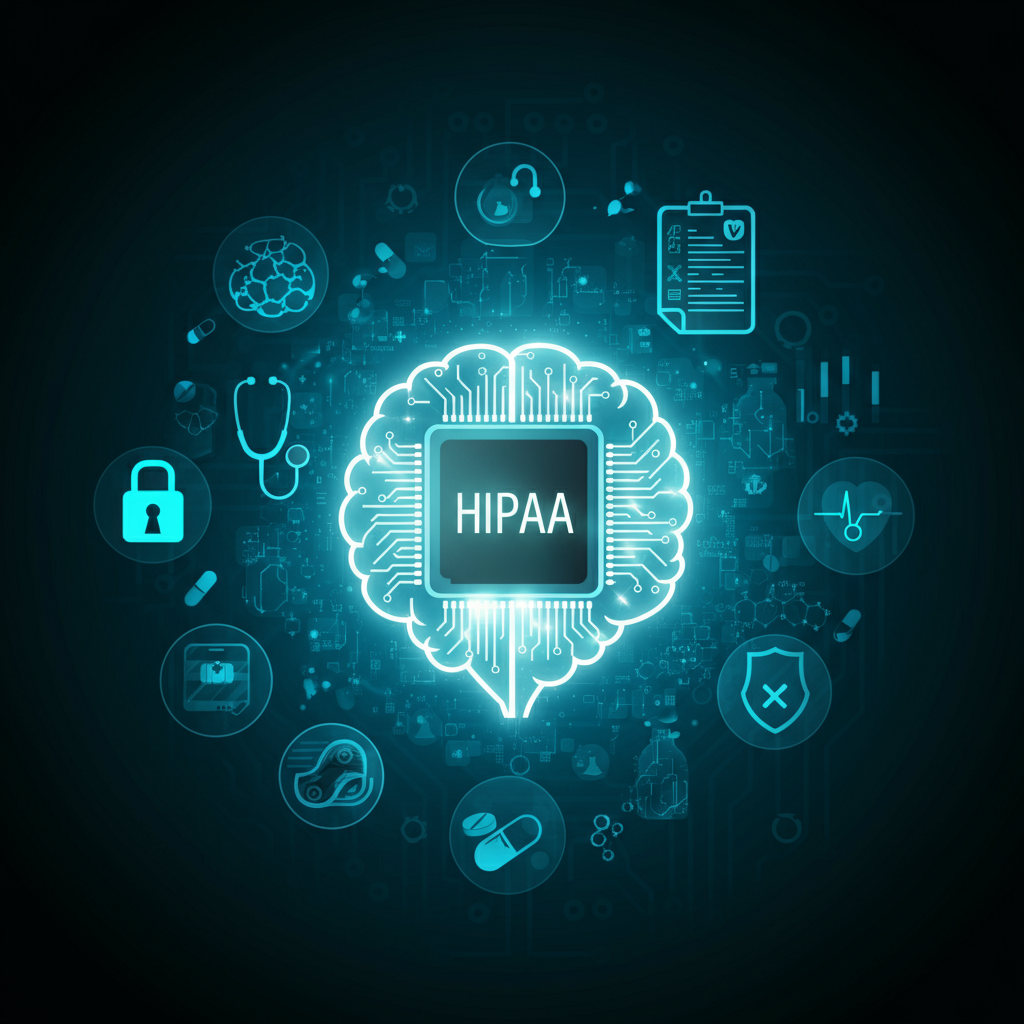Artificial intelligence is transforming nearly every corner of healthcare, from diagnosing complex conditions to enhancing patient experiences. Yet, as impressive as AI is, a critical question looms for healthcare professionals and providers: Are these AI tools HIPAA-compliant?
For healthcare organizations, ensuring compliance with the Health Insurance Portability and Accountability Act (HIPAA) isn’t just a bureaucratic headache; it’s a legal and ethical obligation to protect patient privacy and sensitive data. And when it comes to integrating AI into healthcare, the stakes are even higher. This blog will explore the intersection of AI and HIPAA compliance, offering clear guidance and insights into the road ahead.
If you’ve been wondering, “What chatbots are HIPAA compliant?” or how other AI tools fit into healthcare’s stringent regulatory landscape, you’re in the right place. Let’s break it down step by step.
Understanding HIPAA Regulations
To kick things off, let’s review HIPAA’s key pillars:
- Privacy Rule: The Privacy Rule ensures that patient health information (PHI) remains confidential. It defines how PHI can be used or disclosed, with patient consent being a crucial aspect.
- Security Rule: This rule focuses on safeguarding PHI through administrative, physical, and technical measures, including encryption, access controls, and regular audits.
- Breach Notification Rule: If a breach of PHI occurs, covered entities and business associates are required to notify affected individuals, the Department of Health and Human Services (HHS), and in certain cases, the media.
For AI in healthcare, adhering to these rules creates unique challenges, especially when handling massive amounts of sensitive data.
AI in Healthcare: How It’s Changing the Industry
From streamlining workflows to improving patient outcomes, AI has proven to be a game-changer for healthcare. Here are some of the most prominent applications of AI in the field:
- Diagnostics: AI tools can analyze medical images or patient data to identify diseases such as cancer or diabetic retinopathy with remarkable accuracy.
- Patient Monitoring: Wearable devices and remote monitoring solutions powered by AI provide real-time insights into patients’ health, enabling timely interventions.
- Data Analysis: AI can process vast datasets to identify trends, improve drug discovery, and support evidence-based decision-making.
- Healthcare Chatbots: Chatbots assist with appointment scheduling, symptom triage, and answering common patient questions, offering a smoother patient experience.
But while these advancements are exciting, none of them matter for healthcare organizations without HIPAA compliance.
Challenges in Achieving HIPAA Compliance with AI
Implementing AI in healthcare while staying HIPAA-compliant isn’t always straightforward. Here are some of the common roadblocks:
1. Data Privacy Concerns
AI systems often require extensive datasets to function optimally. Ensuring that these datasets are anonymized while maintaining their utility is a constant challenge. Improper data handling risks exposing sensitive information.
2. Transparency of Algorithms
AI models, particularly machine learning algorithms, are often described as “black boxes.” This means their internal workings are difficult to explain. Healthcare providers must ensure that AI decisions impacting patient care can be understood and justified.
3. Security Risks
Like any software, AI systems are vulnerable to cyberattacks. A breach of an AI tool could expose sensitive medical data. Enhanced measures, such as data encryption and frequent security audits, are vital to guard against these risks.
4. Integration Issues
AI tools need to work seamlessly with existing healthcare systems, including electronic health records (EHRs). Achieving this integration without creating vulnerabilities is an ongoing challenge.
HIPAA-Compliant AI Tools in Action
Several AI tools and platforms are paving the way for HIPAA compliance in healthcare. Here are a few examples:
1. Butterfly Network
Butterfly Network uses portable ultrasound devices combined with AI for on-the-go diagnostics. The platform is HIPAA-compliant, ensuring secure storage and sharing of patient data.
2. Suki AI
Suki AI is a voice-enabled AI assistant designed for healthcare professionals. It takes care of documentation and administrative tasks while adhering to HIPAA’s stringent data privacy and security requirements.
3. Lookout
Lookout combines AI and machine learning to provide security for healthcare data, including mobile devices and apps. It ensures that sensitive information remains protected under HIPAA guidelines.
4. HealthTap
HealthTap is a HIPAA-compliant telehealth platform that uses AI chatbots to enhance patient interactions and facilitate virtual doctor consultations.
These tools demonstrate that HIPAA compliance is possible for AI solutions, provided developers prioritize data security and transparency from the outset.
Best Practices for HIPAA-Compliant AI Implementation
For healthcare organizations looking to implement AI tools while ensuring HIPAA compliance, here’s a checklist to follow:
1. Focus on Data Anonymization
Use advanced techniques to strip sensitive identifiers from datasets without compromising the AI’s effectiveness. Popular methods include tokenization and data masking.
2. Invest in Robust Security Measures
Encrypt all PHI data, whether at rest or in transit. Implement access controls to ensure that only authorized personnel can access sensitive information.
3. Conduct Regular Risk Assessments
Evaluate AI tools for any potential security vulnerabilities or compliance gaps. Regular audits will help ensure ongoing adherence to HIPAA regulations.
4. Choose HIPAA-Compliant Vendors
When partnering with AI providers, confirm that they meet HIPAA requirements and are willing to sign a Business Associate Agreement (BAA).
5. Prioritize Algorithm Transparency
Work with AI vendors who can explain how their algorithms operate and provide audit trails for AI decisions. Transparent algorithms can improve accountability and compliance.
6. Train Your Workforce
Educate your employees about HIPAA compliance and the role AI tools play in your organization. Awareness is key to avoiding accidental violations.
Future Trends and Outlook
The future of HIPAA-compliant AI tools is undoubtedly bright, driven by advancements in technology and a growing emphasis on responsible innovation. Here’s what we can expect:
- Improved Explainability in AI: Ongoing research into interpretable AI models will help make algorithms more transparent and easier to audit.
- Enhanced Data Security Solutions: Innovations in blockchain and quantum encryption could add new layers of protection for healthcare data.
- Evolving Regulations: We may see updated guidelines from organizations like HHS to further clarify the regulatory requirements for AI in healthcare.
Ultimately, successful AI implementation in healthcare will depend on collaboration among developers, healthcare providers, and regulators. Together, they can ensure that technology benefits both patients and practitioners without compromising compliance.
Safeguarding Patient Trust While Innovating
AI has immense potential to revolutionize healthcare, but only when implemented responsibly. Staying HIPAA-compliant isn’t just about avoiding fines; it’s about safeguarding the trust your patients place in you.
If you’re ready to explore HIPAA-compliant AI solutions for your organization, schedule a consultation today. Our experts can help you integrate cutting-edge tools while meeting regulatory standards. Don’t miss the opportunity to lead the future of healthcare innovation.
Yes, when used with Microsoft 365 Health solutions under a BAA.
Not directly, but enterprise API deployment via compliant infrastructure can be made HIPAA-safe.
Azure Health Data Services and Amazon HealthLake are top choices due to full PHI support and audit features.










